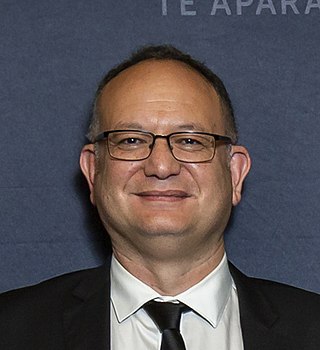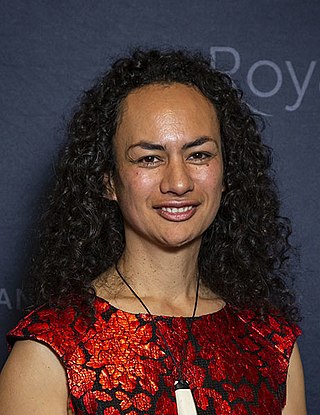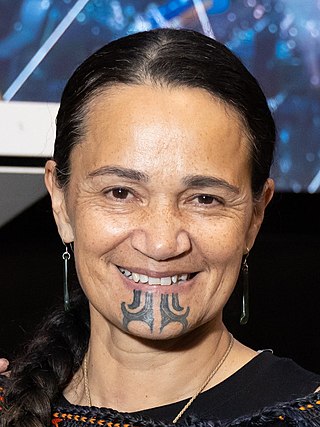
The Royal Society Te Apārangi is a not-for-profit body in New Zealand providing funding and policy advice in the fields of sciences and the humanities. These fundings are provided on behalf of the New Zealand Ministry of Business, Innovation and Employment.

The Department of Labour was a New Zealand public sector organisation tasked with improving the performance of the labour market and, through this, strengthening the economy and increasing the standard of living.

The Ministry of Research, Science and Technology was a government agency within the New Zealand government.

The Ministry of Business, Innovation and Employment is the public service department of New Zealand charged with "delivering policy, services, advice and regulation" which contribute to New Zealand's economic productivity and business growth.

Te Ahukaramū Charles Royal is a New Zealand musician, academic, and Māori music revivalist. He is of Ngāti Whanaunga, Ngāti Raukawa, Ngāti Tamaterā, and Ngā Puhi descent.

Ocean Ripeka Mercier is a New Zealand academic specialising in physics and Māori science.

Te Whakaruruhau o Ngā Reo Irirangi Māori is a New Zealand radio network consisting of radio stations that serve the country's indigenous Māori population. Most stations receive contestable government funding from Te Māngai Pāho, the Māori Broadcast Funding Agency, to operate on behalf of affiliated iwi (tribes) or hapū (sub-tribes). Under their funding agreement, the stations must produce programmes in the Māori language, and must actively promote Māori culture.

Pauline Harris is a New Zealand academic, currently Associate Professor at Te Pūtahi a Toi School of Māori Knowledge at Massey University. She is a central figure in the incorporation of Mātauranga Māori with scientific research in New Zealand, through her roles as Deputy Director (Māori) with the MacDiarmid Institute for Advanced Materials and Nanotechnology and as Associate Vision Mātauranga Theme Leader with the Science for Technological Innovation National Science Challenge. In 2022 she was part of the Matariki Governance Board reporting to the Ministers of Māori Crown Relations, Workplace Relations and Safety, Culture and Heritage and the Prime Minister on the establishment of the Matariki holiday. She is also a leader in developing an Aerospace strategy in Aotearoa that integrates the aims and aspirations of Māori.

Waikaremoana Waitoki is a New Zealand clinical psychologist, academic, and former president of the New Zealand Psychological Society from 2020 until 2022. She is an associate professor at the University of Waikato, and focuses her research on indigenous psychology, Mātauranga Māori and cultural competency.
The Rutherford Discovery Fellowships are an annual science fellowship in New Zealand. The fellowships, established in 2010, are administered by the Royal Society Te Apārangi through a competitive process. Ten fellowships are awarded nationally. The successful Fellows are announced in October/November each year. The awards made in 2023, to twelve recipients, were the final awards.
Tara G McAllister is a New Zealand freshwater ecology academic and is associated with Te Pūnaha Matatini at the University of Auckland. She is a Māori of Te Aitanga ā Māhaki, Ngāti Porou, and European descent.
Jessica Hutchings is a New Zealand researcher, author, and Ashtanga Yoga teacher. Hutchings' work is grounded in kaupapa Māori research within the subject areas of environmental and Indigenous studies.
Ngā Pae o te Māramatanga (NPM) is New Zealand's Māori Centre of Research Excellence (CoRE). It was established in 2002 and is hosted by the University of Auckland with 21 research partners and is funded, like other CoRE's, by the Tertiary Education Commission. The mission was to conduct research for, with and by Māori communities which leads to transformation and positive change.

Ageing Well was one of New Zealand's eleven collaborative research programmes known as National Science Challenges. Running from 2015 to 2024, the focus of Ageing Well National Science Challenge (AWNSC) research was sustaining health and wellbeing towards the end of life, particularly in Māori and Pacific populations in New Zealand.
Bridgette Masters-Awatere is a New Zealand academic and practising psychologist, and is a full professor at the University of Waikato, specialising in Māori psychology and health.

The Deep South, Te Kōmata o Te Tonga was one of New Zealand's eleven collaborative research programmes known as National Science Challenges. Running from 2014 to 2024, the focus of The Deep South Challenge research was adapting to and managing the risk of climate change. Specifically, the programme addressed the role of the Antarctic and Southern Ocean in determining New Zealand's future climate and its impact on key economic sectors, infrastructure and natural resources.

Resilience to Nature's Challenges was one of New Zealand's eleven collaborative research programmes known as National Science Challenges. Running from 2015 to 2024, the focus of Resilience to Nature's Challenges (RNC) research was enhancing New Zealand's resilience to natural hazards such as sea level rise, climate change, wildfire, and volcanoes.

Science for Technological Innovation was one of New Zealand's eleven collaborative research programmes known as National Science Challenges. Running from 2015 to 2024, the focus of Science for Technological Innovation (SfTI) research was physical science and engineering research for New Zealand's economic growth.

Our Land and Water was one of New Zealand's eleven collaborative research programmes known as National Science Challenges. Running from 2016 to 2024, the focus of Our Land and Water (OLW) research was enhancing the productivity of New Zealand farms while improving the quality of land and water.
















